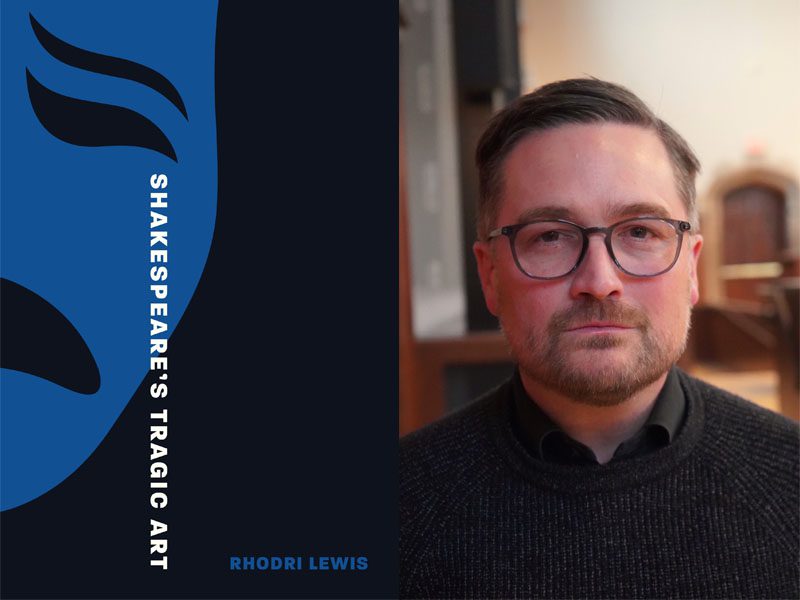Rhodri Lewis is a senior research scholar and lecturer with rank of professor in the Department of English. His latest book “Shakespeare’s Tragic Art” was published in October 2024 by Princeton University Press.
How did you get the idea for this project?
I’ve been worrying away at questions of tragedy more or less since high school, and in 2017 tried to get some of this off my chest by writing a book about Shakespeare’s Hamlet. In it, I argued that if we read that play as a distinctively early modern work of art, we are obliged to think again about what tragedy might be said to comprise. I’d imagined that holding forth about Hamlet would see me clear of the tragic for decade or two, but after the book came out it soon became apparent that I had more to say about tragedy both in general and in its Shakespearean manifestations. After a handful of colleagues made encouraging, and only slightly alarmed, noises to the effect that it had been a long time since the last big book treating Shakespeare’s tragedies in the round, I decided to give it a go.
How did the project develop or change throughout the research and writing process?
This is a hard one to answer. I developed a new appreciation for those of Shakespeare’s tragedies that I’d never really “got” before: Romeo and Juliet and Othello in particular. Part of this was down to recognizing how experimental—and how subversive—much of Shakespeare’s tragic practice was. Part of it was grasping what drove this experimentalism: something like a fixation with how best to devise forms of drama that operate as a principle of aesthetic order while simultaneously reflecting the disorderliness and contingency that are fundamental to the human experience as Shakespeare understood it.
As I wrote, I saw much more clearly that it was the struggle for new forms of aesthetic order—the struggle, that is, to push tragedy to its absolute limits in representing a world that defies rational comprehension—that really motivated Shakespeare’s tragic work. Hence the title of my book and, I suppose, Shakespeare’s eventual abandonment of the tragic worldview for whatever it is that animates his last plays.
What questions for future investigation has the project sparked?
I’m currently working on a “critical life” (which may or may not differ from a biography) of Frank Kermode, and writing Shakespeare’s Tragic Art has helped me to get a much better sense of Kermode’s core concerns: above all, of the ways in which literature, and with it literary criticism, can be said to emerge from the discourses of history, politics, philosophy, theology, and so on while going some distance beyond them in pursuing goals of its own.
More narrowly, I find myself interested in some of the ways in which critical and creative interpretations of Shakespeare’s tragedies have so often sought to foreclose their full complexity in the service of narrative or dramatic or ideological coherence, or simply to be able to assert that they make sense. King Lear through the ages and around the globe (from, say, Nahum Tate to Tolstoy, Kurosawa, and Succession) might make for an interesting case study.
Why should people read this book?
Three reasons, I suppose. First, because it offers readings of some well-known plays that, in attending to them as tragic-artistic wholes, take them in some unusual and hopefully illuminating directions. Second, because in so doing it suggests a model of literary study that is fully responsive to the pull of historical and theoretical concerns, but whose guiding preoccupations are the explication and interpretation of literary texts. Third, because it is concerned to explore the status of tragedy (tentatively, of literature in general) as a space in which to move beyond the dogmatic pseudo-certainties to which we seem as a species to be drawn; in which we might come to terms with the experience of living in a world that we are not equipped to understand, and that we continually deform in our desperation to pretend otherwise.
Shakespeare’s Tragic Art was listed as one of The New Yorker’s Best Books of 2024; read more about faculty on ‘best of’ lists on the University homepage. For more about this book, listen to this podcast interview with Lewis on the Folger Shakespeare Library’s website.
Learn more about other publications by Princeton University faculty in the humanities by exploring our Faculty Bookshelf.
















